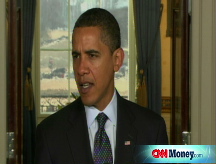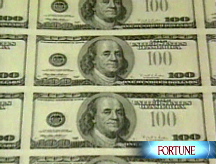Obama talks tough on CEO pay
The president outlined new rules limiting executive pay for firms receiving government aid.
 |
| President Obama is unveiling rules that will sharply limit executive pay at firms receiving government aid. |

NEW YORK (Fortune) -- President Obama is having his say on soaring executive pay.
New rules unveiled Wednesday morning will cap annual cash compensation for executives at firms receiving future government aid at $500,000.
The guidelines prohibit payments above the $500,000 threshold in anything but company shares that must be held until the government's investment has been repaid.
The rules will apply foremost to companies that receive so-called exceptional aid from the government in the future.
Citigroup (C, Fortune 500), Bank of America (BAC, Fortune 500), General Motors (GM, Fortune 500) and AIG (AIG, Fortune 500) are among the firms that have received exceptional aid in recent months, though the new rules won't apply retroactively.
Current rules bar such companies from taking a tax deduction for compensation above half a million dollars, but don't restrict how much executives can receive in salary and bonuses. In addition, the new rules will increase the bans on so-called golden parachute severance packages available for executives.
But the new rules will also cover the supposedly healthy firms that have received money under the Treasury's Troubled Asset Relief Program capital purchase plan, unless the firms take action to be exempted.
The pay rules come amid a fury in Washington over the huge bonuses handed out by Wall Street firms that were on life support before the government stepped in last fall.
Obama and Treasury Secretary Tim Geithner said at a White House press conference that the moves are necessary to "restore trust" in the financial system. Obama acknowledged that the caps are just "a fraction of the salaries that have been reported recently."
Executives on Wall Street made mind-bending sums in the boom years earlier this decade. Goldman Sachs (GS, Fortune 500), which received $10 billion from the government in October, paid chief Lloyd Blankfein $68 million in cash and stock in 2007. JPMorgan Chase (JPM, Fortune 500), recipient of $25 billion, paid CEO Jamie Dimon $30 million that year. Both men turned down bonuses last year.
The tough terms on companies receiving future injections of so-called exceptional aid could force some execs to take some steep pay cuts.
For example, Bank of America chief Ken Lewis made $24.8 million in 2007, including $1.5 million in salary. Each of BofA's top seven executives made at least $700,000 in salary that year, according to federal filings.
Lewis declined his bonus last year, and according to news reports in recent weeks, the bank is planning to pay some 2008 bonuses out over three years. BofA was not immediately available for comment.
But BofA is certainly not the only bank facing criticism of excessive salaries and bonuses. Compensation survey firm Equilar found that TARP recipients with at least $10 billion in assets paid their CEOs $844,229 in salary, on average, and $2.5 million in cash bonuses for 2007, the latest period for which data are available. Total CEO pay in the survey group averaged $11.1 million, the firm said.
And the New York state comptroller's office said last week that New York City securities industry firms had paid $18 billion in bonuses in 2008 - an average of $109,000 per employee. That's more than twice the national median household income.
Obama called the decision to pay the bonuses "shameful," and Sen. Claire McCaskill, D-Mo., introduced a bill that would cap annual executive pay at firms receiving government aid at $400,000 - Obama's salary.
Bank of America, which has sold $45 billion of preferred stock to Treasury and taken $118 billion in loan guarantees, came under attack after Merrill Lynch, the struggling brokerage firm it purchased Jan. 1, paid out $4 billion in bonuses in December. Merrill lost $27 billion last year.
But bonuses aren't the only public relations problem on Wall Street. Perks have also become an issue for firms that have benefited from huge infusions of taxpayer funds.
Citi, which is the recipient of $45 billion of federal capital and $301 billion of loan guarantees, was forced last month to reverse plans to buy a new $45 million corporate jet after Geithner signaled his disapproval.
Wells Fargo (WFC, Fortune 500), which got $25 billion in October under the first round of the TARP capital plan, on Tuesday called off a four-day business meeting in Las Vegas after news reports tagged it as a "pricey Las Vegas casino junket." Wells Fargo called such descriptions "intentionally misleading," but still decided to cancel the event.
The tougher terms imposed on future recipients of exceptional aid are no surprise. But the administration's attempt to expand those rules could make truly healthy firms less apt to participate in future federal aid plans. Dozens of banks have turned down TARP money in recent months, citing possible restrictions on how they operate.
"There's a delicate balance between imposing restrictions and making participating in TARP attractive," said Scott Talbott, senior vice president of government affairs at the Financial Services Roundtable industry lobbying group.
Talbott said financial services firms have been taking action on their own to shift increasing amounts of executive pay to stock and other forms of compensation that align management's incentives with those of shareholders.
Under Obama's plan, some healthy firms that wish to receive TARP funds may still be able to pay executives more than the $500,000 cap. To do so, however, these companies must fully disclose their pay practices and, in some cases, submit to a shareholder "say on pay" vote, which would give investors a chance to vote for or against proposed executive pay levels.
The uproar over executive compensation and perks is predictable and is "part of the cost of taking bailout money," said George Kaufman, an economics professor at Loyola University Chicago.
The news that former Merrill CEO John Thain spent $1.2 million on a 2007 office renovation after taking over a company that had just posted a multibillion-dollar loss is just one example of execs failing to appreciate how times have changed, Kaufman said.
"It just goes to show bankers aren't very clever people," he said. ![]()
-
 The retail giant tops the Fortune 500 for the second year in a row. Who else made the list? More
The retail giant tops the Fortune 500 for the second year in a row. Who else made the list? More -
 This group of companies is all about social networking to connect with their customers. More
This group of companies is all about social networking to connect with their customers. More -
 The fight over the cholesterol medication is keeping a generic version from hitting the market. More
The fight over the cholesterol medication is keeping a generic version from hitting the market. More -
 Bin Laden may be dead, but the terrorist group he led doesn't need his money. More
Bin Laden may be dead, but the terrorist group he led doesn't need his money. More -
 U.S. real estate might be a mess, but in other parts of the world, home prices are jumping. More
U.S. real estate might be a mess, but in other parts of the world, home prices are jumping. More -
 Libya's output is a fraction of global production, but it's crucial to the nation's economy. More
Libya's output is a fraction of global production, but it's crucial to the nation's economy. More -
 Once rates start to rise, things could get ugly fast for our neighbors to the north. More
Once rates start to rise, things could get ugly fast for our neighbors to the north. More









